Corey Johnson and Bill de Blasio are not friends.
And for Johnson, the New York City Council speaker whose friendliness is his defining trait, that’s saying something.
Johnson didn’t even wish the mayor a happy birthday, something the speaker admitted at a City Hall press conference on May 9, the day after de Blasio turned 57. “I meant to, and I forgot. And now you made me feel bad,” Johnson said, with the obvious disappointment of somebody who puts a high value on such social currencies.
Did de Blasio call you on your birthday, Johnson was asked, just a couple weeks earlier? “Um. Definitely not. I didn’t get a belated happy birthday either.”
Then he delivered his kicker. “But I make decisions based on their merit, not based on how I was previously treated,” Johnson said, echoing a line that de Blasio has repeatedly used to defend his decision-making as free from the influence of political donors.
As the press corps laughed, Johnson immediately walked it back – “I’m joking! … I’m not making fun of him!” – but the tension between the two officials has been more than a punchline. Johnson ran for City Council speaker on a bold promise to assert the body’s independence from the mayor, and de Blasio reportedly didn’t want Johnson to get the job. After his first full year leading the council, Johnson has delivered more than just quips – there’s widespread agreement among the council’s members and political observers that he has unified and revitalized the council, delivering legislative victories while acting as a check on the mayor.
In doing so, Johnson has won over his toughest critics in the council. Behind the scenes during the 2017 speaker’s race, an informal group of members was formed who would have preferred “Anybody But Corey” – the ABC caucus. In phone calls with lobbyists and over coffee with reporters, they pushed a theory: Johnson would be a vindictive speaker, crushing the budget hopes and legislative dreams of anybody who got in his way. City Council staffers whispered of “the list” that Johnson kept like a political Santa Claus, keeping track of who supported his candidacy and who had crossed him. A year later, nearly a dozen critics said their worries were unfounded.
“I will fully admit that during the speaker’s race I was a leader of the Anybody But Corey caucus,” New York City Councilman Ben Kallos told City & State. “I will say that after working with him over the first year as speaker, that I was wrong. And everything he has done since becoming speaker has been about getting things done.”
Others echoed Kallos. “If Corey had an approval rating in the City Council,” said City Councilman Ritchie Torres, who also ran for speaker, “I suspect it would be nearly 100 percent.”
Much of the praise for Johnson comes at the expense of de Blasio. “I think there’s a general recognition that there’s a leadership void in New York City. And Corey is filling it,” Torres said. “He is a larger-than-life speaker in the midst of a vanishing mayor.”
De Blasio will reach the term limit of his office at the end of 2021 and already seems to be suffering from final-term fatigue. While he won re-election in a landslide last year, New York City’s overwhelmingly Democratic voters just gave their Democratic mayor a lackluster 43 percent approval rating. And The New York Times recently reported that the mayor showed up at City Hall just 10 days a month over the first nine months of this year. By contrast, Johnson seems to everywhere. At City Hall, yes, but also at tree lightings, beach volleyball matches, canvassing days and dance parties. His star is in the ascendant, while de Blasio’s is setting. Talk of a Johnson run for mayor in 2021 has already begun, and Johnson isn’t ruling it out.
It’s no surprise that City Council members were clamoring formore independence from the mayor’s office, especially following four years under former City Council Speaker Melissa Mark-Viverito. She reached the term limit in the council at the end of 2017, and the Manhattan Democrat was frequently criticized for being too closely aligned with the mayor to be an effective check after de Blasio played an integral role in helping her win the speakership.
To be fair, Mark-Viverito sued the de Blasio administration in 2014 to oppose charter schools sharing space with public schools, fought to hire more police officers despite the mayor’s objections and called on the city to close Rikers Island long before de Blasio got on board with the idea. Sure, de Blasio never vetoed a bill passed under Mark-Viverito, but he has yet to veto a bill passed under Johnson either.
The mayor’s office rejected Johnson’s narrative of renewed independence. “The last speaker was independent, this speaker is independent, and I bet the next speaker will be independent of the next mayor,” de Blasio press secretary Eric Phillips told City & State in response to this story. “The mayor and Speaker Johnson have a productive relationship.”
Nevertheless, members insist the approach has changed on the east side of City Hall, which holds the council offices, saying they feel more institutional support when they want to speak out against the mayor. “He’s absolutely been more independent (than Mark-Viverito),” City Council Minority Leader Steven Matteo told City & State. “He’s certainly doing a good job of putting the council first.”
City Councilman Rafael Espinal Jr., an early Johnson ally, agreed. “He’s done a great job. He’s been able to push conversations that past leadership hasn’t been able to push,” he said.
That includes winning a budgetary battle with the mayor, convincing the city to fund the Fair Fares pilot program, which will subsidize half-price MetroCards for low-income New Yorkers. Johnson also passed a law capping the number of for-hire vehicles like Uber in New York City – something Mark-Viverito considered, but never passed in her time as speaker.In his first year, Johnson also strengthened the Oversight and Investigations Committee and subjected numerous de Blasio appointees to tough questioning. He held hearings on long-stalled bills, such as the Small Business Jobs Survival Act, and managed to pass a bill further regulating waste transfer stations that advocates had pushed for more than a decade.
Larger battles loom. The City Council is holding a series of hearings on the deal to bring a new Amazon office to Long Island City, Queens, which the de Blasio administration is hoping to push through without council approval. The council is considering a bill to legalize electric bicycles and electric scooters, which de Blasio is wary of allowing. And Johnson recently said he’ll push to get the city’s potter’s field, Hart Island, under the control of the Parks and Recreation Department, even if the mayor resists.
On a late afternoon in early December, City & State sat down with Johnson in his City Hall office to talk about his first year as speaker. Johnson kept the overhead lights off, but three lamps gave the room a homey feel. He sipped a mason jar of Diet Coke with a paper straw while talking for more than 45 minutes about his relationship with de Blasio and with his City Council colleagues. He described his fury over being left out of the Amazon deal, why there’s nothing wrong with saying you’re sorry and what might keep him from running for mayor in three years.
This interview has been edited for length and clarity. Hover over the highlighted text for more information.
[[{"fid":"6782","view_mode":"default","fields":{"format":"default","field_file_image_alt_text[und][0][value]":"New York City Council Speaker Corey Johnson","field_file_image_title_text[und][0][value]":"New York City Council Speaker Corey Johnson"},"type":"media","field_deltas":{"2":{"format":"default","field_file_image_alt_text[und][0][value]":"New York City Council Speaker Corey Johnson","field_file_image_title_text[und][0][value]":"New York City Council Speaker Corey Johnson"}},"attributes":{"alt":"New York City Council Speaker Corey Johnson","title":"New York City Council Speaker Corey Johnson","class":"media-element file-default","data-delta":"2"}}]]
You spent a lot of time during the speaker’s race talking about the importance of independence from the mayor. Have you lived up to that?
What I always said publicly and privately to the mayor before I was speaker was that whenever there was disagreement – and there would be plenty of disagreement – that it would never be personal. That I would never make it personal with him. And that the council asserting its independence and using its charter-mandated authorities and responsibilities would be done in a responsible manner on issues that were important to the members of this body and to New Yorkers, who want answers and want tough questions and want meaningful oversight and want legislation and want negotiated land use projects and want all of those things. I feel like that should be the case not just about this mayor, but that should be the council’s posture and role for any mayor – that the institution matters.
My hope is, at the end of these four years, that hopefully, my main accomplishment will be having established a council, an independent, responsible, strategic, thoughtful branch of government that worked on behalf of New Yorkers and also allowed council members the freedom that they all deserve to work on issues that are important to them and to the districts that they represent.
You’re a student of political history. I read a 1991 Times article about the council asserting its independence from then-Mayor David Dinkins. In shaping the council, are you looking to the past for guidance? Or to other sources, perhaps like how Congress interacts with the president?
I don’t think there is any fully analogous moment in history or legislative body that I have tried to model the council after. I inherited as speaker a pretty strong body. Any body can be stronger. But I don’t think the institution was in a place that needed total refashioning. I thought there was ways to enhance the good work that we were doing.
We’ve been significantly beefing up the land use staff here at the council. Given how contentious we see land use approvals are in New York City, I wanted the council to be an effective counterweight in land use negotiations. That’s why earlier this year I took no shame in increasing the council’s operating budget. I was very open and public about that because I said that we needed more staff to be effective in the areas that are important to us as a body.
On the budget process, we asserted ourselves and had substantial wins on Fair Student Funding and Fair Fares – which is a very big deal. We created the Oversight and Investigations (Committee) . I think we’ve been pretty prolific in legislation. I believe that by the end of this year, with the next two stated meetings in December, I think we’ll be on track to pass into law nearly 200 bills. Which I think in the first year of the previous council, my first year as a council member, I think they passed like 90 bills into law. We’ve almost doubled that in the first year
. I think we’ve been pretty prolific in legislation. I believe that by the end of this year, with the next two stated meetings in December, I think we’ll be on track to pass into law nearly 200 bills. Which I think in the first year of the previous council, my first year as a council member, I think they passed like 90 bills into law. We’ve almost doubled that in the first year .
.
You seem to be a real believer in the good of the Uniform Land Use Review Procedure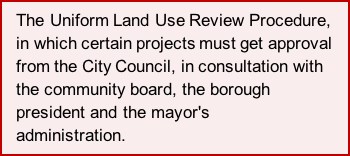 . Did it feel like a betrayal from de Blasio to cut the council out of the Amazon deal?
. Did it feel like a betrayal from de Blasio to cut the council out of the Amazon deal?
It’s indefensible. It’s totally indefensible. The public review process exists for a reason. And the vast majority – probably more than 98 percent of land use actions – ultimately get approved by the council through good faith negotiations. The Amazon deal, I don’t know. I still don’t know if it’s a worthy deal. I have very
– ultimately get approved by the council through good faith negotiations. The Amazon deal, I don’t know. I still don’t know if it’s a worthy deal. I have very significant concerns here, which I’ve talked about: subverting the land use process; the public subsidies; gentrification and displacement concerns; how Amazon has treated their workers; how they’ve been anti-union; transportation issues; workforce development issues. All of those issues. But I can’t evaluate whether or not the project is good because there has been no process around the project
significant concerns here, which I’ve talked about: subverting the land use process; the public subsidies; gentrification and displacement concerns; how Amazon has treated their workers; how they’ve been anti-union; transportation issues; workforce development issues. All of those issues. But I can’t evaluate whether or not the project is good because there has been no process around the project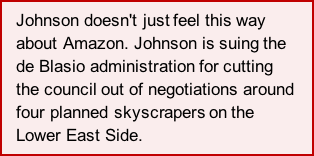 . I haven’t had the opportunity to ask these questions to the (New York City) Economic Development Corp. and to (Empire State Development) and to Amazon.
. I haven’t had the opportunity to ask these questions to the (New York City) Economic Development Corp. and to (Empire State Development) and to Amazon.
And that’s hopefully why we’re having a series of Amazon hearings is to, in some way – not totally analogous, but in some way – to replicate ULURP! To ask all sorts of questions, to let the public come and testify, to get answers on the record. Because that’s what New Yorkers deserve. Not just residents of Long Island City and the surrounding neighborhoods but the entire city, because of the precedent that this sets.
Have you appealed to de Blasio as a former councilman, who went through ULURP?
He knows how I feel . And again, I haven’t made it personal! I think, whether it is Fair Fares, or NYCHA, where we had the hearing in February exposing the heat and hot water outages that plagued over 80 percent of NYCHA residents, or the oversight we’re going to do on Amazon, or the very tough questions that we ask agencies on a regular basis, the hearing we had not that long after the snowstorm
. And again, I haven’t made it personal! I think, whether it is Fair Fares, or NYCHA, where we had the hearing in February exposing the heat and hot water outages that plagued over 80 percent of NYCHA residents, or the oversight we’re going to do on Amazon, or the very tough questions that we ask agencies on a regular basis, the hearing we had not that long after the snowstorm – I could give you many, many, many hearings. But we have vigorously, thoughtfully and strategically used our oversight in a way that’s never been personal. It’s really just about getting answers for New Yorkers, and wanting to make government more transparent and effective for the people we’re supposed to serve. And I think that people thought, given the – how do I say this – it’s all water under the bridge. You can ask Mark Levine. You ask Robert Cornegy, you ask anyone who ran for speaker. And you ask people, like my good friend Helen Rosenthal, who supported other people who ran for speaker, I have not been vindictive once. You can say in the article that I yelled once, when I said once, because I have not been vindictive once.
– I could give you many, many, many hearings. But we have vigorously, thoughtfully and strategically used our oversight in a way that’s never been personal. It’s really just about getting answers for New Yorkers, and wanting to make government more transparent and effective for the people we’re supposed to serve. And I think that people thought, given the – how do I say this – it’s all water under the bridge. You can ask Mark Levine. You ask Robert Cornegy, you ask anyone who ran for speaker. And you ask people, like my good friend Helen Rosenthal, who supported other people who ran for speaker, I have not been vindictive once. You can say in the article that I yelled once, when I said once, because I have not been vindictive once.
I’ve asked around.
Zero! Not once. And the reason that I am raising my voice is because there was this caricature about me that was spun, that I was going to come in, and that I was going to punish people and bully people and hurt people and unfairly hurt members who ran for speaker, or members who supported other people for speaker, and I was going to play favorites. That has not happened once in a year. I haven’t acted that way to council members, I haven’t acted that way to the mayor. So I am really proud of that because I knew that’s the type of speaker that I was going to be. That I was not going to make this personal or petty or divisive. And that is not what everyone said was going to happen if I became speaker. And I’m really proud to have led the body in a unified way that respects individual members, pushes back against the other side of City Hall when appropriate, but not in a personal way.
I am actually a pretty – and this is what was sort of laughable to me when these tales were being spun – I’m like a pretty conflict-avoidant person, honestly. I don’t like conflict!
I read back through an article on the speaker’s race last year, saying critics “fear Johnson’s open aggression in campaigning will only worsen if he assumes leadership.”
Exactly! I don’t know who fears me! Some people may fear me because of unpredictability. And the meaning of unpredictability is I’m not in anyone’s pocket. I think there’s also this tale that was spun at the beginning of my time being speaker that I was going to be a weapon and a puppet for the governor to be used against the mayor. No! I’m my own person and I see my responsibility is to be a steward and safeguard of this institution and not to play political games.
You’ve made news twice now by asking commissioners to apologize, with then-NYCHA Commissioner Shola Olatoye for so many tenants being left without heat, and with Sanitation Commissioner Kathryn Garcia for the city’s poor response to the November snowstorm.
There’s nothing wrong with apologizing! I apologized. I didn’t support the Uber/for-hire vehicle cap in (2015). And I didn’t understand the significance of what was to come
I apologized. I didn’t support the Uber/for-hire vehicle cap in (2015). And I didn’t understand the significance of what was to come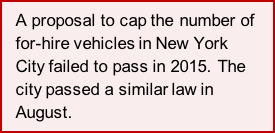 . And I apologized for that. I said I’m sorry. I wish we acted back then. And I said sorry after the snowstorm, even though I’m not in charge of the snowstorm (response). But sometimes, people just want to hear ‘sorry.’ Not in a hollow, fake, insincere way, but you just have to acknowledge sometimes that you could have done better and you’re hopefully going to learn lessons.
. And I apologized for that. I said I’m sorry. I wish we acted back then. And I said sorry after the snowstorm, even though I’m not in charge of the snowstorm (response). But sometimes, people just want to hear ‘sorry.’ Not in a hollow, fake, insincere way, but you just have to acknowledge sometimes that you could have done better and you’re hopefully going to learn lessons.
We asked Shola to apologize. She didn’t really want to apologize. She should have apologized. We asked the Health Department to apologize on lead (paint) and children. They didn’t really want to apologize. We asked (the Sanitation Department) to apologize on the snowstorm. They apologized on messaging, but not on logistics. I don’t think there’s anything wrong with apologizing. Everyone’s human. People can make mistakes. If you make a mistake, it doesn’t mean you’re a bad person.
to apologize. She didn’t really want to apologize. She should have apologized. We asked the Health Department to apologize on lead (paint) and children. They didn’t really want to apologize. We asked (the Sanitation Department) to apologize on the snowstorm. They apologized on messaging, but not on logistics. I don’t think there’s anything wrong with apologizing. Everyone’s human. People can make mistakes. If you make a mistake, it doesn’t mean you’re a bad person.
You talked about being a check on the mayor. I don’t believe you’ve used the council’s subpoena power yet.
That’s correct.
Was there ever a time when that was a question?
We’ve come close.
Have you gotten all the documents you’ve wanted?
Not yet.
That’s NYCHA, that you’re waiting on?
Yes.
How often do you talk with the mayor?
It’s been a lot. It’s been cyclical. In the first six months, from January to June, we were meeting either once a week or once every two weeks in person, in his office on the other side of City Hall. The summer, it was a little slower here. We still met during the summer, but not as much after the budget was done.
And the mayor calls me often. I call him if I think there’s a problem. I called him the night of the snowstorm, and I said this is like a disaster, like ‘What the hell is going on?’ So he and I have a very civil, good, respectful working relationship with each other.
Is it ever friendly?
Yeah, it’s friendly.
You ever talk Red Sox ?
?
He likes to talk about the Red Sox! I like the Red Sox.
But one of the things that I appreciate now, towards the end of this year, is that when I criticize, when I push back, when I take actions that potentially could make (the mayor’s office) uncomfortable, I don’t think they – at least not outwardly – seem that upset. I think they expect it. I think they expect that I’m going to be fair. That I’m going to speak out. And that I’m not going to do it in a sort of over-the-top, trying-to-score-points, dragging-them-through-the-mud, type of way. I try to do it in a straight shooter, thoughtful way. When I can, I try to give them a heads-up. That’s not always possible. I said how I felt about Joe Esposito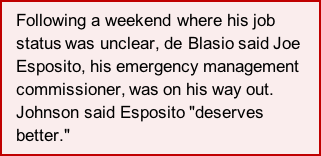 . I didn’t talk to the mayor about it. I just thought it was the right thing to do.
. I didn’t talk to the mayor about it. I just thought it was the right thing to do.
[[{"fid":"6783","view_mode":"default","fields":{"format":"default","field_file_image_alt_text[und][0][value]":"New York City Council Speaker Corey Johnson with New York City Mayor Bill de Blasio","field_file_image_title_text[und][0][value]":"New York City Council Speaker Corey Johnson with New York City Mayor Bill de Blasio"},"type":"media","field_deltas":{"3":{"format":"default","field_file_image_alt_text[und][0][value]":"New York City Council Speaker Corey Johnson with New York City Mayor Bill de Blasio","field_file_image_title_text[und][0][value]":"New York City Council Speaker Corey Johnson with New York City Mayor Bill de Blasio"}},"attributes":{"alt":"New York City Council Speaker Corey Johnson with New York City Mayor Bill de Blasio","title":"New York City Council Speaker Corey Johnson with New York City Mayor Bill de Blasio","class":"media-element file-default","data-delta":"3"}}]]
Has there been an instance where you were quiet on an issue you had with the mayor?
No, I think when I’m asked, I say something. Sometimes I’m just not asked. And the smart folks here (at City Hall) say, “You don’t have to say anything if you’re not asked.”
I mean, you come to the press conferences. I take as many questions as people want to ask me and never try to cut out. People ask me questions. I don’t avoid the questions or say I’m not answering those questions. I kind of just say how I feel! So I don’t feel like I’ve been muzzled or too cute by half in choosing my words in a very weird way.
I feel – not about waxing nostalgic or being too emotional – I feel so fucking lucky. I tweeted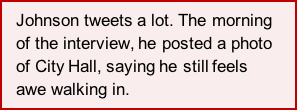 – I got here early this morning.
– I got here early this morning.
It’s not an exaggeration to say that I still feel awe walking into City Hall: just like I did when I was in my early 20s & dreamed of one day working in this historic building.
— Corey Johnson (@CoreyinNYC) December 4, 2018
Good morning w/ gratitude from City Hall!
Maybe its just the afterglow of seeing Cher last night! pic.twitter.com/Y0yR3wVMyM
The light was coming off City Hall nicely.
The light was coming off City Hall, there was no one in the parking lot, there was no one on the steps. I’m walking in – I remember that I was sitting in the balcony in January 2006, right when Chris Quinn was being voted on as speaker. And I remember sitting up there – and I’d only been on the community board for Chelsea for six months. I really wanted to work in government. I really wanted to hopefully one day run for office. I hadn’t gone to college. I remember thinking, ‘Wow, I wonder what it’s like to sit down there on that floor? Cast votes on things you care about.’ So now to walk in this building and have this ability to do work on behalf of the city that you love tremendously, in an institution that has such an impact on people’s lives, I feel so fortunate and so grateful.
I’m a bit of a cryer. I cry all the time. I could see someone do something nice for someone on the subway and I start crying. And so sometimes I get really emotional. Like oh my god, I’m just so fortunate and lucky.
There will be other speakers. There will be other leaders of this body. There will be other mayors. And I only have a small amount of time. And part of me feels like, if you’re given a platform and people will listen to what you’re saying for that short period of time, make it worthwhile. Make it meaningful. Say what you have to say. Talk about issues like Silence = Death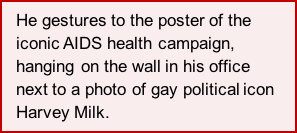 . You know, Hart Island
. You know, Hart Island . Talk about issues that may not be the most popular issues or issues that there’s a groundswell around. But issues that matter to you. And issues that you think that you can make a difference on. And I’ve tried to do that. Because I know that there will be a day when I’m not in elected life. And that’s fine. And there will be other people that they’re going to want to hear from. And that’s fine. But for the time that I’m here, I want to make the most of it. I’m really proud of this first year. I’m proud of the issues that we’ve worked on, but I’m also proud to have proven people wrong. Like it really hurt me. Honestly. I felt really, like, ‘Who is this person they are caricaturing?’
. Talk about issues that may not be the most popular issues or issues that there’s a groundswell around. But issues that matter to you. And issues that you think that you can make a difference on. And I’ve tried to do that. Because I know that there will be a day when I’m not in elected life. And that’s fine. And there will be other people that they’re going to want to hear from. And that’s fine. But for the time that I’m here, I want to make the most of it. I’m really proud of this first year. I’m proud of the issues that we’ve worked on, but I’m also proud to have proven people wrong. Like it really hurt me. Honestly. I felt really, like, ‘Who is this person they are caricaturing?’
My mother would call me. Every night when my mom goes home, she goes to news.google.com. And she types in “Corey Johnson speaker.” And so my mom reads every article. My mom doesn’t have a Twitter account, but my Twitter account’s public, so she goes on every day and looks at my Twitter feed. My mom, during the speaker’s race, would call me and be like, ‘Who are they writing about?! Who’s talking to these people?!
If you talk to Mark Levine, if you talk to Helen Rosenthal, if you talk to Ben Kallos, if you talk to Kalman Yeger, if you talk to Robert Cornegy or anyone else who initially wasn’t supportive of me – they all called me after the budget and they said they were treated so fairly. They were treated fairly in legislation. And I knew that’s how I was going to act! I knew that! And so to be in a place a year later, where there’s not sniping, there’s not personal animosity, there’s not battle lines drawn – it’s more like, ‘Let’s get the work done. Let’s make a difference in people’s lives. Let’s take on these difficult issues that sometimes seem intractable and try to be creative and thoughtful.’ Like on speed cameras , what we did! What can we do here? That’s what I’m really proud of.
, what we did! What can we do here? That’s what I’m really proud of.
You’re looking back, but you’re also looking forward. Have you put more thought to running for mayor in 2021?
I feel really conflicted. (Long pause.) I really wish I had a husband. I really wish that I had children. There’s still time. All hope is not lost yet, even though sometimes it feels that way. For me, the importance of my life goes beyond elected office. And I don’t want to walk out of elected office one day and think: ‘How come I didn’t do enough to build my personal life?’ And so I struggle with that balance.
“I really wish I had a husband. … I don’t want to walk out of elected office one day and think: ‘How come I didn’t do enough to build my personal life?’– New York City Council speaker Corey Johnson
Do you think about Ed Koch when you say that?
when you say that?
Not just Ed Koch. There are a lot of council members here that are single. It’s not an easy life. I’m not complaining. I chose this life. No one forced me to do it. I could walk away at any time. I love it! Again, I’m grateful. But I do want a family. I want that. And this is not the easiest pace or daily schedule to be able to date. To be able to – if you’re a gay man, have kids. I could adopt children. I’m open to adopting children. But I struggle with that versus loving working on the issues that matter to me and making a difference in people’s lives. And being able to learn every day about issues I otherwise wouldn’t be able to learn about. And balancing those things is hard.
And I also have a lot of other passions that I could see myself doing beyond elected office. I don’t think this is the only thing that’s a good fit for me. There are other ways that I could serve the city in a way that would feel meaningful to me.
Sounds like this is a really measured decision. It’s not just you immediately looking for the next job.
I haven’t started fundraising! Not one fundraising phone call. There’s not one check to an account. And everyone’s been telling me: fundraise! Raise money! What are you doing! And I really wanted to focus just on being speaker this first year and doing a really good job. And I don’t know what the future holds.
I mean, I do want to run for another office. But I don’t feel a crushing amount of pressure to figure it all out right away. I really feel like, if you do a good job in the job you’re in, if you do it in a competent, respected way, if you’re authentic and human and open, then possibilities will present themselves.
And the other thing is that New York politics is crazier than any place in the country. Who thought Eliot Spitzer would be gone in less than two years, and David Paterson would become governor? And Andrew Cuomo, after losing in 2002, would come back to be attorney general four years later? And Anthony Weiner would crash and burn for the second time? I mean these are all things that no one predicts. There will be things that happen.
Look at Tish James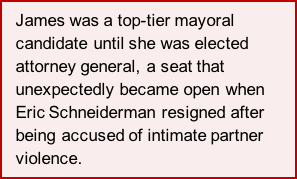 .
.
Tish James! I don’t know how these things are going to play out. Man plans, the universe laughs. I can plan as much as I want, but some things are going to just happen the way they’re supposed to happen, and I sort of feel at peace with it. I never thought that I’d get this far!
Well you can’t just become mayor. Do you have any sort of a timeline of, ‘Boy I really need to make a campaign account by 2020?’
I assume that I’ll start fundraising. In case, whatever I decide to run for, that those resources are there. But 2019 is sort of going to be, at least politically, as it relates to electoral politics, a slower year. With the lead-up to the 2020 presidential election, and you have to lay the groundwork in 2019 and in 2020. But 2021? Right after November of 2020, that’s when things heat up for 2021, and it becomes 11 months, 10 months of madness for the folks that participate in that election.
I feel very grateful. That’s really all it is. I feel very fortunate, I feel very blessed, I feel very grateful, and I feel like there is still so much I have to learn. I learn a lot every day.
When I became speaker – I think it was like my second week. I had to wake up super early one day because Paul Vallone wanted me to go out to his ceremonial swearing-in, which was very early in the morning at a high school in Bayside. And it was so far from Chelsea. And I went, and it was great. I’m happy for Paul and his family and his constituents. And I remember when I was driving back in the car … I was by myself. And the Lady Gaga song came in. And I just sort of put it on Instagram, and then tweeted it. And then all sorts of people started telling me – good, smart people! – ‘Don’t do that. That’s like childish and juvenile. That’s not befitting of the office.’ And then, you know, I would lip-sync and dance and do what I do, and tweet about random things. And of course, this isn’t the important stuff we do in this position or in life, but you know, I sort of thought, ‘I’m just going to be myself.’ I’ve always been myself, and it’s always worked. I talk about being sober, I talk about being HIV-positive, I talk about struggles I went through. I talk about these things. It’s all sort of worked out. This is what I like. This is what I enjoy. It might be goofy, it might be a little eccentric and odd sometimes. But, you know, I am who I am, as they said in “La Cage aux Folles.”
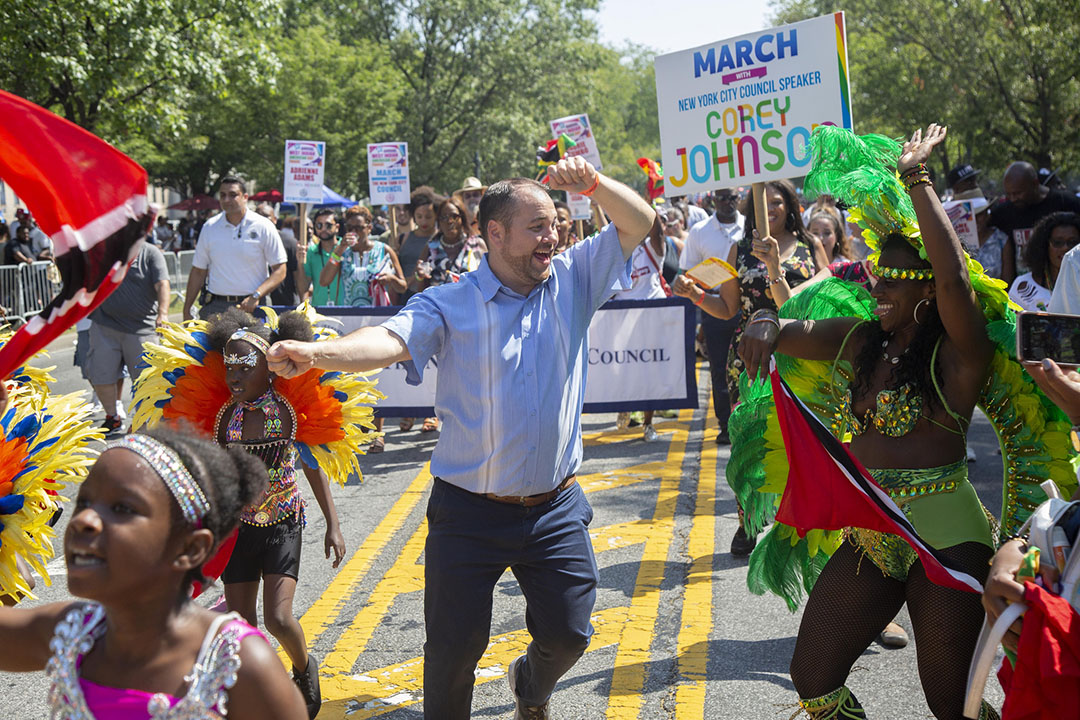
Would you ever run for Congress?
I’d love to go to Congress! But you know, Jerry Nadler is fabulous, fantastic, and one of my mentors and role models. I would never, ever run against Jerry Nadler and he’s going to do a great job as chair of the Judiciary Committee.
NEXT STORY: Andrew Cuomo looking at things


